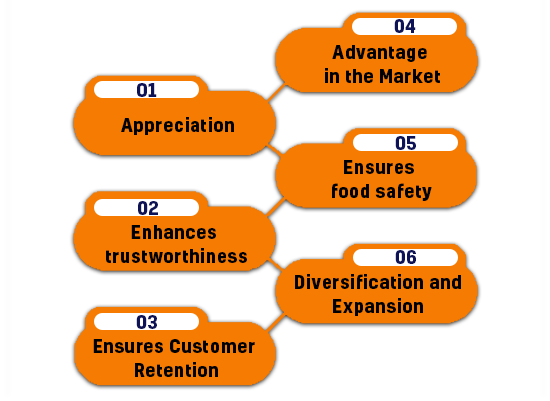Brief of FSSAI State License
Anyone who wants to start a food business must first obtain an FSSAI licence. The State FSSAI License is required for small and medium-sized manufacturers, retailers, distributors, marketers, and those involved in the food business and related operations. The FSSAI is in charge of overseeing business operations and giving FSSAI licences to food industry owners.
To receive this licence, the food business operator must operate in only one state. This licence applies to all food units that trade within India and have an annual revenue of INR 12 Lakhs to INR 20 Lakhs. This licence has a five-year term with a one-year minimum validity period.
FSSAI-licensed food establishments
FSSAI stands for Food Safety and Standard Authority of India, and it is the primary authority in charge of regulating and supervising food safety and hygiene in India. All food operators doing business in India must have an FSSAI licence, which is issued by this government.
The Food Safety and Standards Authority of India (FSSAI) has developed standards for food operators, as well as regulations for the manufacture, storage, sale, import, and distribution processes, to ensure that the food consumed by millions of people is safe, hygienic, and of good quality.
The authority has also established a network of information for the general public and consumers to obtain accurate and reliable information on food safety, cleanliness, and other related issues. The following are the several types of FSSAI licences that have been issued:
- State License
- Central License
- Basic Registration
The size of operation on which they operate determines the type of licence they receive. Following that, we'll go over the state licence in further depth.
Why is a State licence from the FSSAI required?
A person must guarantee that the items used in the food business are not dangerous in any way before starting a food business. We all know that food is an extremely delicate topic because it has such a direct impact on one's health. All you have to do now is determine whether you are eligible for a Basic, State, or Central licence. Food business owners may be eligible for a state licence if they meet certain criteria. In the following scenarios, a state FSSAI licence is required:
- Every person engaging in food operations activities such as production, selling, transportation, or in any way dealing with food items must get a state licence.
- The Food Safety and Standards Act of 2006 has made significant reforms to protect and improve food quality and hygiene. To start a food business, a person must obtain an FSSAI registration and licence, according to the laws.
- Whether it is a Basic, State, or Central licence, all Food Business Operators must meet all of the Act's standards and duties
- The provisions of the Food Safety and Standards Regulations 2011 control and control the issuance of a licence or registration certificate.
- The type and nature of the food business determines the FSSAI licence or registration requirements.
- If a food business operator’s action spread to more than one state, the main branch/head office must obtain a Central FSSAI licence. A State License or Basic Registration is also required for each branch, depending on their eligibility.
- The FSSAI licence is a one-time cost that lasts one to five years, depending on the needs of the company.
If the food operator fails to obtain an FSSAI licence, he will be charged with a legal offence and fined for his ignorance.
What are the Benefits of Getting a State License from the FSSAI?
Obtaining a food licence has various advantages for food operators: -

Appreciation
The food licence and logo raise brand visibility and recognition among customers and the general public.
Enhances trustworthiness
A valid food licence enables businesses at all levels to improve and increase their trust.
Ensures Customer Retention
The FSSAI Logo aids in the client acquisition process.
Advantage in the Market
Food businesses with an FSSAI licence have a competitive advantage over their competitors in the same market.
Ensures food safety
It ensures the safety of food in terms of health and hygiene.
Diversification and Expansion
The FSSAI licence ensures that the business can expand and diversify quickly.
FSSAI State License Eligibility
The yearly sales of the business must lie between Rs. 12 lakhs and Rs. 20 crores to qualify for a State Food License. The owner of a food business must apply for an FSSAI State License with the state government where the business is located. The following entities are eligible to apply for a state licence if their turnover is greater than the indicated amount:
- Operators in the food industry with yearly sales ranging from Rs. 12 lakhs to Rs. 20 crores.
- Foods that are only available to a limited number of people.
- Units for the production and processing of vegetable oil using the solvent extraction process, as well as refineries that include an oil expeller unit. With a revenue range of Rs. 12 lacs to Rs. 20 crores each year.
- Hotels with a four-star rating or lower.
- Dairy units, comprising milk chilling equipment, having a daily limit of 500 to 50000 lit to handle or process.
- Storage facilities with a yearly capacity of fewer than 50,000 metric tonnes.
- More than 2 and up to 50 huge animals can be slaughtered per day. Alternatively, the ability to handle more than ten and up to 150 tiny animals.
- All food processing units, including repackers, having a daily capacity of at least 100 kg/liters and up to 2 metric tonnes are permitted.
Required Documents for an FSSAI State License
Following documents are required for applying for FSSAI State Registration-
- Particulars of Partners, Directors, Proprietors, and Executive Members of Society with full address and contact details are essential for application for State Registration.
- A passport-sized photo of the applicant is required.
- The applicant's evidence of identification and proof of address are required.
- The applicant's PAN card.
- A copy of the title deeds (If the place of business is owned by the applicant).
- A copy of the rental agreement as well as the landlord's No Objection Certificate are required (If the property is rented).
- Source of Raw Material.
- Form has been correctly filled out and signed.
- A list of all the equipment and machinery in the unit that is installed and operational.
- The municipality has issued a certificate of no objection.
- Details of the food category, as well as the complete specifications of the product to be created.
- The Directorate General of Foreign Trade has produced an e-code document.
- Persons nominated by a firm on Form IX.
- The name and address of the responsible person must be included in the letter of authorization.
- Management System certificate of the plan pertaining to food safety.
Fees charged by the government for FSSAI state licences
The Food Business Operator must pay the required fees by Demand Draft, Treasury Challan, or Cash.
The government charge varies depending on the manufacturer's capacity to produce:
|
Manufacturer |
Fees per Year |
|
|
5000 |
|
|
5 Lakh |
|
Up to four-star hotels are available. |
5000 |
|
•Canteens, restaurants, clubs, caterers, banquet halls with food catering services, Dabbawalla system, and other food company operators are all examples of food service providers. |
2000 |
What is the procedure for obtaining a state licence from the FSSAI?
The FSSAI License is based on the size of the business and the location. Before launching a food business, the food business owner should consider the following factors: eligibility criteria, fee structure, documentation requirements, and so on. To obtain a State FSSAI License, follow the steps listed below.
Step 1:
Submitting Form B is the first step. When the food unit's revenue is less than 20 crores and its operating zone is limited to the state, the form must be filled out.
Step 2:
Within 7 days after the application date, the department may approve or reject the application.
Step 3:
If the department approves the application, a registration certificate with the 14-digit registration number (which includes a state code and registration) and the applicant's photo will be issued.
Step 4:
Following receipt of the certificate, the food business operator must display the registration certificate at the place of business during normal business hours.
Non-compliance will result in a penalty
Noncompliance in the food industry can be quite costly. Running a food business without an FSSAI licence will result in severe penalties as well as a negative brand image. The safety officers will conduct inspections, and the levels of compliance for the food business will be granted by the officers. Food safety authorities impose sanctions in the event of non-compliance. The following are the fines imposed in the event of non-compliance:
Why Choose Us

Free Legal Advice

Transparent Pricing

On Time Delivery

Expert Team

Money Back Guarantee

200+ CA/CS Assisted

Lowest Fees

Easy EMIs
Frequently Asked Questions
Every FBO (Food Business Operator) with an annual turnover of Rs 12 lakh to Rs 20 crore is required to obtain a State FSSAI licence.
No, the FSSAI State Manufacturing License and FSSAI State Trading License have the same turnover limit as the FSSAI State License.
 9559179325
9559179325 9559179325
9559179325 9559179325
9559179325











